Why Trustworthy Brands Will Win the Holiday Shopping Rush

Ever since the pandemic came to town, our reliance on the internet has reached an all time high. With screen time on the rise and more opportunities to research purchasing options, brand reputations, and the latest corporate social responsibility scandal — to say that brands and retailers will be under the microscope this holiday season would be an understatement.
While higher customer expectations around the holidays is nothing new, there are plenty of fresh variables at play this year. As COVID-19 infection rates continue to fluctuate in tandem with retail sales and disposable income, plenty of uncertainty remains in 2020.
Will consumers tighten their purse strings given the economic downturn? Or will considerations like vacation cancelations, fewer restaurant and bar tabs, and the urge to end the year on a high note mean more spent on holiday gifts this year?
And perhaps most importantly for those selling holiday gifts in saturated ecommerce categories: how will consumers decide what to buy, and from whom to buy it?
With even more at stake than usual this year, savvy holiday shoppers will be on the lookout for indicators that your brand will meet their expectations before they even consider clicking ‘BUY’.
So, let’s start by taking a look at why a trustworthy brand reputation is more important than ever as we ride out 2020 — and wrap up with some actions you can take to ensure your online presence glows with trustworthiness wherever consumers are looking for you.
The Rising Tides of Consumer Expectations for Holiday Shopping
Consumers have been on high alert since lockdown began. On top of the obvious mass uncertainty, the pandemic has also caused a global recession, disrupted industry supply chains, and exposed major ecommerce categories like health and beauty to reselling fraud and counterfeiting — leading 33% of US consumers to be more cautious about products in these categories due to online misinformation.
All of this uncertainty has called not only products, but entire brands, into question — reflecting a new high water mark for consumer wariness, as well as consumer expectations.
According to the experts at McKinsey, the pandemic has led to a new consumer behavior pattern that retailers can expect to see through the holidays: shoppers are more focused than ever on the perceived value of their purchases.
So what can you do to level up the perceived value of your products, and clear a higher bar for consumer expectations?
Brands and retailers take note: There’s a direct correlation between your brand reputation and consumers’ perception of value.
And when it comes to brand reputation, trustworthiness should be your goal.
A Trustworthy Brand Reputation Begins With Your Online Presence
Chances are that over the last decade, you’ve focused on growing your brand on relevant social media platforms, ensured your visibility in search results, basked in the glow of positive online comments — and maybe even received some negative feedback.
Perhaps you’ve noticed that your brand’s online presence has become more important with each passing year. That’s because your online presence is your primary channel for capturing social proof, a marketing asset that’s been around since the dawn of advertising.
And while yesterday’s social proof looked like testimonials quoted in print ads, the social proof that carries the most weight today takes the form of online trust signals like social media comments and customer reviews.
Consumer research has uncovered that social proof is even more important to consumers during the pandemic — from stronger urges to see what others are buying to navigate unprecedented circumstances, to more skepticism directed at unfamiliar businesses.
Smart shoppers want to confirm that a brand can be trusted before they buy, whether it’s a matter of life or death, or simply adapting to a new lifestyle:
34% of consumers report checking reviews of businesses and services more frequently than they did before lockdown
73% of consumers want to see how companies have been handling the virus
23% of consumers report decreased trust in companies since the outbreak
And 55% of consumers are more worried about online scams than they were prior to the pandemic
The writing’s on the wall: this is the year to make sure your brand’s online presence is trustworthy.
7 Steps to a Trustworthy Online Presence in Time for the Holidays
Trustworthy brands are about the long game, but chances are you already have a good foundation of brand equity to highlight across your online presence. Below are some actionable steps you can take to meet consumer expectations for a trustworthy brand reputation leading up to the holiday rush — and beyond.
1. Make sure your brand has online reviews by November.
In general, every brand should be collecting reviews in 2020.
To make your online presence as powerful as possible leading up to peak shopping season, make sure your brand has customer reviews discoverable online by early November.
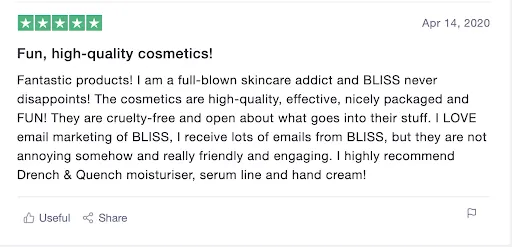
Bliss World displays their hard-earned customer feedback on third-party review sites.
Traffic to third-party review platforms sees a swift uptick each year between October and November, as shoppers start planning their holiday hauls and looking to the wisdom of their peers to find out which online stores will meet their expectations.
In fact, traffic to the reviews on Trustpilot grew between the 2018 and 2019 peak shopping seasons. This year it’s safe to say there will be an even bigger spike in light of consumer behavior trends during the pandemic, so make sure you have reviews in place as soon as possible.
2. Make time to respond to customer feedback during the holiday shopping rush.
Consumer review data shows that shoppers write the most reviews between November 1st and New Years. Unsurprisingly, more transactions during holiday preparations lead to more feedback from customers, and that’s a golden opportunity for brands.
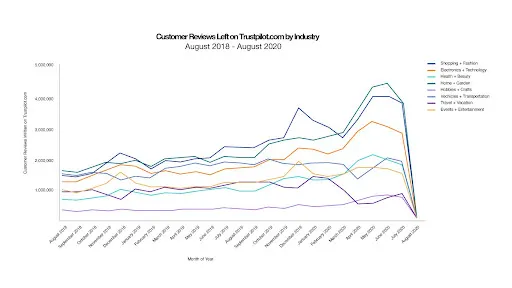
According to Trustpilot’s 2020 Consumer Insights Report, shoppers leave the most reviews from November to January, and they expect a reply.
More feedback means more chances to show off what your customers love about shopping with you, and ultimately convey your trustworthy brand reputation.
But more feedback can also mean a bigger spotlight on where your business can improve, and your future customers are just as interested in how you respond to any issues raised as they are in your positive reviews.
Making time to respond to your feedback — regardless of the sentiment — shows potential customers that you’re a brand with integrity, and that you’re safe to buy from.
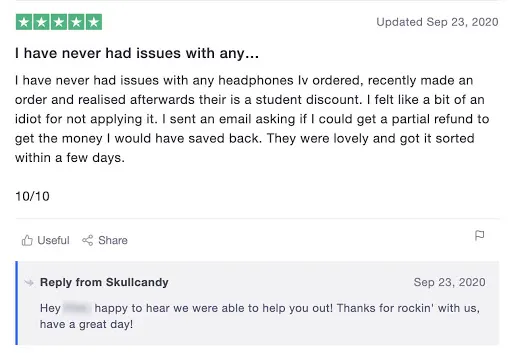
Skullcandy builds trust in their brand by publicly replying to reviews on third-party review platforms.
And for a bonus tip — if you’re sitting on a mountain of unanswered reviews from last year’s holiday rush, don’t miss the opportunity to reply retroactively. Deep down shoppers know that no one’s perfect, so a late reply is better than no reply.
You could even score some extra points by showing your sense of humor and acknowledging your delayed response.
3. Level up your customer service experience.
If you’ve ever wondered what matters most to shoppers during the holiday season, you’re not alone. Here are your answers.
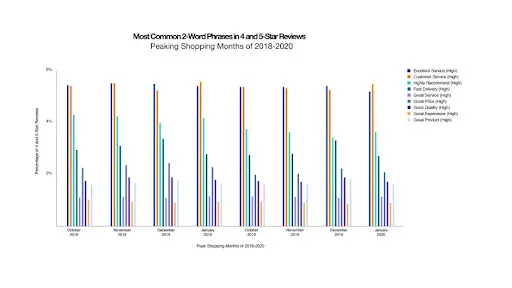
According to Trustpilot’s 2020 Consumer Insights Report, “Customer Service” is mentioned most frequently in positive feedback, appearing in 5.5% of 4 and 5-star reviews.
For positive reviews left during the holiday shopping season over the last two years, “Excellent Service” and “Customer Service” got the most mentions, appearing in about 5.5% of all reviews.
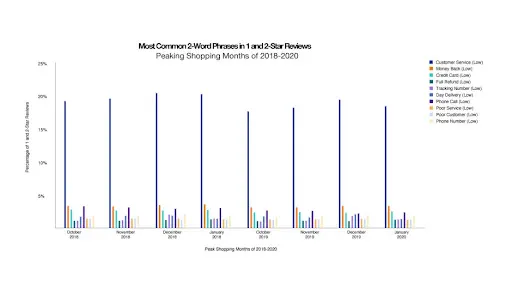
According to Trustpilot’s 2020 Consumer Insights Report, “Customer Service” is also mentioned most frequently in negative feedback, appearing in 20% of 1 and 2-star reviews.
As far as negative reviews, “Customer Service” was again most frequently mentioned, appearing in about 20% of reviews from the same time period.
Given its prevalence across the best-of-the-best and the worst-of-the-worst customer feedback, it’s safe to say that your customer service experience can have a huge impact on the perception of your brand online.
While this holiday season might present some unavoidable logistical challenges, you can still impress your customers by offering more details about your shipping options, and taking care to update the fulfillment times on your website. At the end of the day, they just want to manage their expectations.
And if it’s feasible, consider planning ahead for holiday complexities by investing in customer service resources before and during peak shopping season. Even a temporary investment in additional customer services resources can pay in dividends by earning you a loyal customer for life.
4. Highlight your brand reputation on product pages.
Instilling trust at the very top of the buying journey is a huge part of making more sales this holiday season — but let’s not overlook the importance of highlighting your reviews and ratings right on your product pages.
805Consumer review data shows that impressions on review widgets spike year after year during peak shopping season, but they’ve also soared 34% since lockdown began — especially in competitive categories like fashion and home and garden.
Highlighting your reviews on your website not only improves conversions, but also increases order value — and decreases cart abandonment.
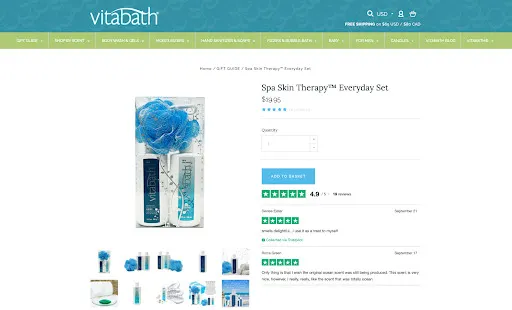
Vitabath displays product reviews right on the product page to instill customer confidence when it matters most.
If you want to showcase your brand reputation where it matters, make sure to display your reviews not only on product pages, but across any landing page your future customers might encounter along the buying journey.
5. Level up your trustworthiness in organic search results with structured data.
Your organic search presence is a great way to capture the attention of savvy shoppers who might be deterred by listings labeled “ad” — and it’s even more important to consider as consumers begin flocking to Google to find the best holiday shopping options.
You’re probably thinking: Can my organic search listings really stand a chance next to the strategic PPC ads highlighting their star ratings at the top of the page?
The answer is yes, definitely — because product reviews can make you eligible for rich results (read: star ratings) in organic search.
On top of building your brand reputation in the eyes of almighty search engines, product reviews help Google gain a deeper understanding about not only your product offerings, but your brand. That’s because generally, product reviews are marked up with structured data.
Stick with us…
Structured data is how your website communicates its content and metadata (think: how much people love your products) to search engines. Search engines rely on this to extract information from each page and serve up the best listings in organic search results.

Vitabath’s product pages stand out with star ratings in organic search thanks to structured product review data.
So if you’re hoping to improve the credibility of your listings in organic search — structured data is exactly what you need to make sure that Google sees your reviews, and that your star ratings display as review snippets on the SERPs.
Something to keep in mind: the way your organic listings appear in search results is up to Google’s discretion, so it’s a good idea to familiarize yourself with their latest guidelines for implementing structured data:
Google’s structured data guides are the best way to make sure your implementation stays up to date with Google’s policies.
Google’s structured data reference pages are also worth bookmarking to ensure that your implementation stays up to date.
Google’s structured data testing tool is perfect for previewing and troubleshooting your implementation. You can learn more about it here.
6. Show off Google Seller Ratings on your Google Ads.
With so much shopping taking place online since the pandemic started, the competition in paid search is getting steeper by the day. Regardless, many ecommerce companies continue to allocate a huge part of their digital marketing budget to paid search without seeing the results they intended.
But thanks to Google Seller Ratings, there’s plenty of hope for merchants aiming to improve their paid search performance in time for the holidays.
A close relative of the organic review snippet stars discussed above, Google Seller Ratings are an automated Google Ads extension designed to show your potential customers that other shoppers trust your brand and have had a good experience with you — right on the ad listing itself.
Again, whether Google displays Seller Ratings on your paid search listings is entirely up to their discretion. Their latest guidelines state that Seller Ratings are displayed on a per-country basis and require at least 100 reviews per country over the last 12 months, and a rating of at least 3.5 out of 5-stars, in order for star ratings to appear.
Collecting reviews through a trusted Google Review Partner is a great first step towards qualifying.
You can find a full list of review providers to consider in the official Google Seller Rating support materials.
7. Convey trustworthiness in your Google Shopping listings.
For those who haven’t taken the plunge into Google Shopping, it basically provides shoppers with a round up of products from advertisers and merchants who have chosen to feature their products on this convenient new channel.
Most importantly, it offers shoppers a side-by-side comparison of relevant products and in some cases, even lets them buy the product without leaving Google.
Initially, participating merchants paid certain fees and commissions depending on their usage, but Google announced in April 2020 that it’s now free to sell on Google Shopping in the US. This was meant to give smaller businesses more exposure during the pandemic and level out the playing field of selling online, and these changes will take effect globally by the end of 2020.
So, now is the time to cultivate your online presence on Google Shopping, no matter where you’re located.
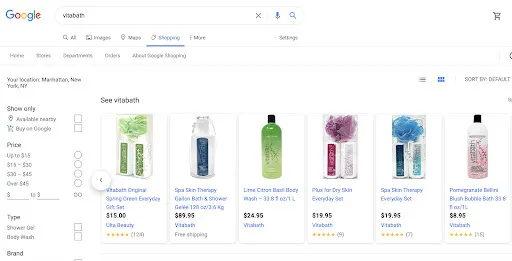
Vitabath makes sure their glowing reputation carries over to Google Shopping by maintaining their Google Seller Ratings.
Your brand reputation is particularly important in the context of Google Shopping because this channel sets up consumers to make a snap judgment about your product listing without referring to your website or social channels.
Once again, star ratings are here to help. If you want to stand out in Google Shopping for the holiday rush, focus on earning and maintaining your Google Seller Ratings.
Consider this a holiday gift to yourself: If you qualify for Google Seller Ratings, stars will automatically appear on your Google Shopping listings with no action needed from you.
Wrapping Up
No matter how much we innovate, cultivating a trustworthy brand reputation will always be a long game. You can’t just claim that you’re a trustworthy brand — it has to be earned.
There might not be a switch you can flip to achieve widespread brand affinity overnight, but there are a number of ways you can instill trust in holiday shoppers throughout the buying journey. If your customers have had good experiences buying from you, it won’t be hard to convey that across your online presence.
In practice, building up a trustworthy brand will look different for each ecommerce business. No matter what tactics make sense for you, keep in mind that consumers gravitate towards transparent brands that aren’t afraid to engage with their customers.
In the wake of the global pandemic and human rights movements this year, expect holiday shoppers to be more skeptical as we close out 2020. On top of seeking the best customer experience for their money, they’ll likely prefer to support the brands who lived by their values, took a stance on important issues, and did right by their customer base — even when times were tough.
So as we head into the holiday rush of a high stakes year, try to keep your online presence top of mind. Make sure you convey that your brand won’t be the source of any headaches this holiday season. Let them know you’re a brand they can feel great about supporting, when each transaction means more to everyone.

Wynn Mustin leads the global content marketing team at Trustpilot. With over six years spent selling things online — and writing about her experiences for blogs big and small — it’s safe to say she’s obsessed with the internet and everything that comes with it. When she’s not developing industry research and thought leadership content for Trustpilot, you can find her working on her eCommerce brand of 3D printed jewelry.